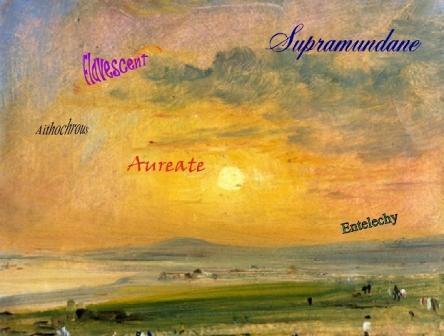How to write descriptions vividly and well
How do you develop a good 
descriptive style? Do you have to use fancy language to write
novels well?
I've had a question from Integral, who was commenting on my recent post Writing for your day job is nothing like writing a novel. 'One of the biggest problems I face when trying to write prose is that my vocabulary is too limited to paint scenes vividly. I'm a copywriter and I trained as a journalist, and having a fairly limited vocabulary hasn't been a particular disadvantage so far. I simply need to be able to write clearly and concisely. But when I come to write prose, I really struggle to find the right words to use. What's more, my metaphors and similes seem forced.'
In a novel, more is expected of the prose than a straightforward account. The reader has an inner cinema to light with imagery, a poetic ear to beguile. As Dave said in a comment on that same post: 'the difference between writing fiction and writing other types of documents is like the difference between talking and singing'.
Developing a descriptive style takes time, and quite a bit of trial and experimentation. There are books that can help nudge you to widen your vocabulary. I use Roget's Thesaurus and I'm also rather interested in The Describer's Dictionary by David Grambs.
A lot of writers read poetry to tune into what language can do when cut free from its functional bonds. I return constantly to William Golding's novel Pincher Martin. Here's the opening, in which a sailor has been pitched overboard:
'There was no up or down, no light and no air. He felt his mouth open of itself and the shrieked word burst out. "Help!" '
So what makes a good description?
Integral mentioned metaphors and similes. These are often overused by writers who are grasping for a more elaborate style. There is nothing wrong with them if they're fresh and well deployed, but there are many more ways to create arresting prose.
Look at that description from Pincher Martin; it does not contain a metaphor or simile, yet reading it is like bypassing language and mainlining pure sensation. It is observant, truthful, unusual.
Notice also that it is not laden with adjectives or adverbs. Or unusual words – except for 'of itself', but that is an artefact of when the novel was written rather than an obscure construction. The power of this description is all in what Golding notices about drowning – that is unique and he says it plainly.
To develop your descriptive instrument you need to be on a constant quest to be more daring, flexible and different.
Not just language
Although a writer's style is what we notice most obviously on picking up a novel, a good novel is more than pretty prose. There's characterisation, structure, plotting, themes, the way you use your setting and so on. Going more poetic, there's story metaphor.
In Charlotte Bronte's Jane Eyre, there is a strange screaming presence in a far-off attic. This represents Jane's repressed, passionate nature (and is also a darn good mystery). In Daphne du Maurer's Rebecca the first Mrs de Winter is a ghost who represents second Mrs de Winter's profound feelings of inadequacy. Although Bronte and du Maurier have voices that are full of passion and mystery, those stories would still work if they were told in a much plainer style.
Last but not least
In my novels, the language is what I hone last, when everything else is ticking along nicely. Only then do I worry about the imagery and descriptions. And that takes a lot of sweat. I think carefully about each line, taking several runs at each sentence before I'm happy it does what I want – and that it is truthful and mine.
Your voice is you
And this is my final point; your voice has to be you (I've written about it here in How to develop a strong writing voice). Work out what your literary strength is, and learn to use it well. It might be your sense of fun, mystery or mischief – like JK Rowling. Or fun and irony, like Jane Austen. If dense poeticism doesn't come naturally to you, there's nothing wrong with simpler language. Your stories can still be resonant, relatable, entertaining and universal. If clarity is your strength, build on that. It never did Ernest Hemingway any harm.
Good writers are great observers. To write description well, learn to notice the unusual, and to say it in an original way.











